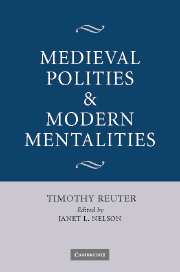Book contents
- Frontmatter
- Contents
- Editor's note
- Acknowledgements
- List of abbreviations
- Editor's introduction
- PART I MODERN MENTALITIES: HISTORIOGRAPHIES, METHODOLOGIES, PRECONCEPTIONS
- PART II THE SYMBOLIC LANGUAGE OF MEDIEVAL POLITICAL ACTION
- PART III POLITICAL STRUCTURES AND INTENTIONS
- 11 Assembly politics in western Europe from the eighth century to the twelfth
- 12 Sex, lies and oath-helpers: the trial of Queen Uota
- 13 Plunder and tribute in the Carolingian empire
- 14 The end of Carolingian military expansion
- 15 The Ottonians and Carolingian tradition
- 16 The making of England and Germany, 850–1050: points of comparison and difference
- 17 King, nobles, others: ‘base’ and ‘superstructure’ in the Ottonian period
- 18 The ‘imperial church system’ of the Ottonian and Salian rulers: a reconsideration
- 19 Peace-breaking, feud, rebellion, resistance: violence and peace in the politics of the Salian era
- 20 The medieval German Sonderweg? The empire and its rulers in the high Middle Ages
- 21 Mandate, privilege, court judgement: techniques of rulership in the age of Frederick Barbarossa
- 22 All quiet except on the Western Front? The emergence of pre-modern forms of statehood in the central Middle Ages
- Index
20 - The medieval German Sonderweg? The empire and its rulers in the high Middle Ages
Published online by Cambridge University Press: 12 August 2009
- Frontmatter
- Contents
- Editor's note
- Acknowledgements
- List of abbreviations
- Editor's introduction
- PART I MODERN MENTALITIES: HISTORIOGRAPHIES, METHODOLOGIES, PRECONCEPTIONS
- PART II THE SYMBOLIC LANGUAGE OF MEDIEVAL POLITICAL ACTION
- PART III POLITICAL STRUCTURES AND INTENTIONS
- 11 Assembly politics in western Europe from the eighth century to the twelfth
- 12 Sex, lies and oath-helpers: the trial of Queen Uota
- 13 Plunder and tribute in the Carolingian empire
- 14 The end of Carolingian military expansion
- 15 The Ottonians and Carolingian tradition
- 16 The making of England and Germany, 850–1050: points of comparison and difference
- 17 King, nobles, others: ‘base’ and ‘superstructure’ in the Ottonian period
- 18 The ‘imperial church system’ of the Ottonian and Salian rulers: a reconsideration
- 19 Peace-breaking, feud, rebellion, resistance: violence and peace in the politics of the Salian era
- 20 The medieval German Sonderweg? The empire and its rulers in the high Middle Ages
- 21 Mandate, privilege, court judgement: techniques of rulership in the age of Frederick Barbarossa
- 22 All quiet except on the Western Front? The emergence of pre-modern forms of statehood in the central Middle Ages
- Index
Summary
As medievalists we all know, or think we know, that Germany Was Different. In most other European kingdoms, whether English, Scottish, French, Castilian, Aragonese, Portuguese, Sicilian, Neapolitan, Hungarian, Danish or Norwegian, a modernization paradigm seems to apply. The period between about 1100 and 1350 saw a Weberian transformation of rulership from a mixture of the charismatic and the patrimonial to the bureaucratic, if only incipiently so. It is not difficult to recite the litany of developments: hereditary rulership ensuring continuity (‘the king is dead, long live the king’); hierarchically organized appellate jurisdiction; officials paid at least in part on a salaried basis; institutions which had a fixed existence and often even a permanent physical location and were not wholly dependent on the whims or itinerancy of the ruler for the time being; institutionalized consultation between the ruler and his subjects about legislation and taxation; the general acceptance of the doctrine that all authority derived ultimately from the king, for whom, in a later stage of development, an abstraction like the crown or the state could then be substituted. But the regnum Teutonicum failed to make the transition between Passages from Antiquity to Feudalism and Lineages of the Absolutist State, to use Perry Anderson's terminology. Germany came to modernity late, differently or not at all, and can thus be said to have experienced a medieval Sonderweg.
- Type
- Chapter
- Information
- Medieval Polities and Modern Mentalities , pp. 388 - 412Publisher: Cambridge University PressPrint publication year: 2006
- 4
- Cited by



